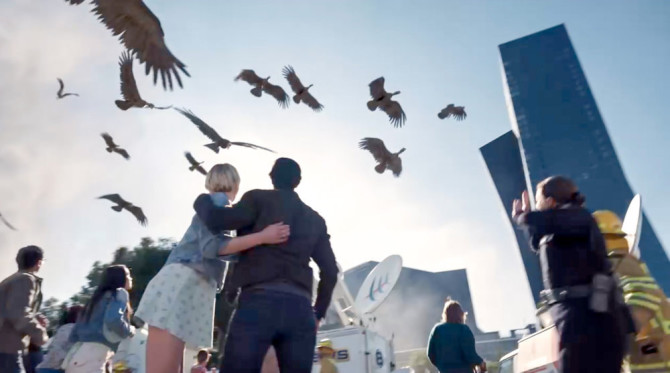Is La Brea the new Lost?
Genre: TV Pilot/Drama/Sci-Fi
Premise: (from IMDB) A massive sinkhole mysteriously opens up in Los Angeles, separating part of a family in an unexplainable primeval world, alongside a disparate group of strangers.
About: Here’s series creator David Applebaum on his high concept show: “The genesis of the idea was just an image of a sinkhole opening in the middle of Los Angeles, and it was just an image that I couldn’t shake. I had never seen a show open that way with something so dramatic and I knew I wanted that to start the story, but didn’t know anything else. But started asking so many questions about why does the sinkhole open? Where does it go? Who are the people that fall in? And then, once you’re starting with those questions, you start to create a world of characters in situations. And then from there, a thousand other things happen, but it really just started with an image.”
Writer: David Applebaum
Details: 60 min
If you’re anything like me – and you probably aren’t but let’s just pretend for a second you are – you miss “Lost.” That show took over my life. For a good five years, everything was built around Wednesday’s at 8 o’clock. I couldn’t get enough of that show. Even when the Lost backlash began and everybody started piling on JJ (“HE ONLY KNOWS HOW TO ASK QUESTIONS! NOT ANSWER THEM!”), I was still Team Lost. Even detractors have to admit that there was something magical about that show. And if you disagree, I have the ultimate argument to prove you wrong.
For the next five years, all anybody did was try to recreate Lost. AND FAILED. Here are just some of the shows that attempted to become “the next Lost.” Flash-Forward, Threshold, V, The Event, Invasion, and the most successful of the failures, Heroes. People think Lost was a bad show? No no no no no. THOSE were bad shows.
It turns out Lost was lightning in a bottle, the perfect TV idea, never to be repeated again.
Or maybe not.
Recently, there’s been a resurgence in trying to recreate Lost, probably because writers who loved the show and were in that target demographic (18-25) when it aired have now become seasoned enough to be able to pitch their own shows. Westworld sort of re-started the “Lost” like formula. A couple of years back there was Manifest, which is now in its final Season on Netflix. And today we get La Brea, which is the most Lost-y show yet. Hell, one of the characters in the pilot literally says, “Or maybe we’re just stuck in an episode of Lost.”
The reason I even gave La Brea a chance at becoming the next Lost is because it has a genuinely cool premise. Let’s take a look at how the pilot shakes out.
Set in Los Angeles, the show starts off with mother, Eve Harris, driving her teenaged kids, Josh and Izzy (who has a prosthetic right leg), across town somewhere, when, all of a sudden, a giant sinkhole appears near La Brea and 3rd Street, swallowing up five square blocks of real estate. Everyone in their cars and inside of buildings fall into the hole of death, including Eve and her son (Izzy and her prosthetic leg are able to outrun the hole).
After the government sets up a perimeter around the hole and begins a clean-up process, Eve’s husband and former Air Force pilot, Gavin, swoops into town. But he’s not just here to hug his daughter with the prosthetic leg. No. You see, several years ago, Gavin had strange visions which got him kicked out of the military. He’s having those visions again, but this time they’re more specific: he can see his ex-wife and a bunch of other people STILL ALIVE.
Cut to a hilly tree-lined rural land and a giant piece of building in the middle of it, along with a bunch of cars and dazed people stumbling around. I’ll save you the mystery. Eve and everyone else on La Brea are a few hundred thousand years in the past, in Los Angeles BEFORE it was Los Angeles. “Those are the Hollywood Hills,” someone points out. The show then sets up a scenario where we will jump back and forth between the past and the present until somebody figures out the mystery of how they ended up here and, hopefully, a way to get home.
Let me just go ahead and say that, so far, I like this show.
At times the writing is juvenile. Frustratingly so. Yet it’s a really cool premise with all sorts of possibilities. I mean, towards the end of the pilot, a group of our time-traveling characters get into a standoff with a saber-tooth tiger. Count me in on that!
But I am oh so worried. This show is already exposing weaknesses and we’re only in the pilot episode. As a means of comparison, Lost didn’t show any cracks until its third season, a full 50 episodes in. Let’s go over a few of these concerns.
The dad had visions – This is extremely concerning. Just going off the odds, what are the chances that someone who has special visionary powers will have a wife that, three years later, will be involved in the single most unique event in the history of humanity? Clearly, the only reason he has this power is that the writers needed a way to bring the husband into the military mix. So they gave him this special power that the military needs. It’s a lazy juvenile coincidental choice that makes me think more choices like it are coming. Although I hope I’m wrong!
The default is melodrama – One of the reasons that cable has usurped the buzzy one-hour drama from networks is because they leaned into more realistic interactions between people. Meanwhile, the network shows are still stuck in melodrama. When your big opening scene turns ultra slow motion while focusing on a prosthetic leg JUST BARELY pushing away from the final crumbling concrete of a giant sinkhole, that’s melodrama. Even Lost knew this. Whenever Jack was saving someone, it felt genuine. It didn’t feel like this over-acted silliness that networks seem to think audiences still like, and which we’re seeing here.
The cars and buildings didn’t survive the fall from the sky but, somehow, all humans did – This is something one of the characters even says. “How are all the cars damaged but we’re okay?” “I don’t know,” another person says. I know they’re going to try and answer this question at some point but it’s clear that the reason the people survived the fall is that they wouldn’t have a show if they didn’t. There is no answer down the road that will adequately explain this, which means they’ll have to construct some nonsensical answer that will ultimately disappoint us.
There are a couple of things going on here. First, the pilot is the foundation for your story. If it’s not solid, the episodes that follow it are going to be even less solid. To make matters worse, each subsequent episode will display the law of diminishing returns. This is why bad shows seem to get worse with every episode. I’m hoping La Brea is an exception to the rule but I’m not optimistic.
Second, a good mystery isn’t built off of a coincidence you need for your story to work. A good mystery is something you create for the sole purpose of the mystery alone. So everyone surviving a fall from 30,000 feet in the air in order for you to have a show isn’t a designed mystery. It’s more of a “paint yourself into a corner” mystery. Polar bears on a tropical island. THAT’S a good mystery because it was specifically designed into the show.
Despite all this, I was into all the stuff that was happening in the pre-historic era. I love the idea of a technology-dependent people being thrust into a past where they’ll be tasked with surviving giant wolves, saber-tooth tigers, cave men, and who the hell knows what else. The power of any show basically comes down to its ideas. Are the ideas imaginative and dramatically compelling? So far, La Brea has that going for it.
I’m just worried they’re going to get in their own way. Will the sloppy conveniences continue? Will the melodrama continue to be laid on too thick? I hope not. Because I would love more than anything to finally be able to watch the next “Lost.”
[ ] What the hell did I just watch?
[ ] wasn’t for me
[x] worth the stream
[ ] impressive
[ ] genius
What I learned: David Applebaum got his first job as a P.A. in the writer’s room of the O.C. Desperate to become a writer on the show, David pushed to move up, eventually becoming a script coordinator (in charge of reading and distributing scripts to everyone on the production and cast) but they wouldn’t give him a writing job. Applebaum said that was his first big lesson learned in Hollywood. “Don’t stay anywhere just because it’s comfortable. Keep your end goal in mind and make choices that help you achieve that goal.” Because they clearly weren’t going to let him write on the O.C., Applebaum quit. He finally got his first paid writing job several years later on a pilot that didn’t get picked up called King’s English. A couple of years after that, he started writing on The Mentalist.




